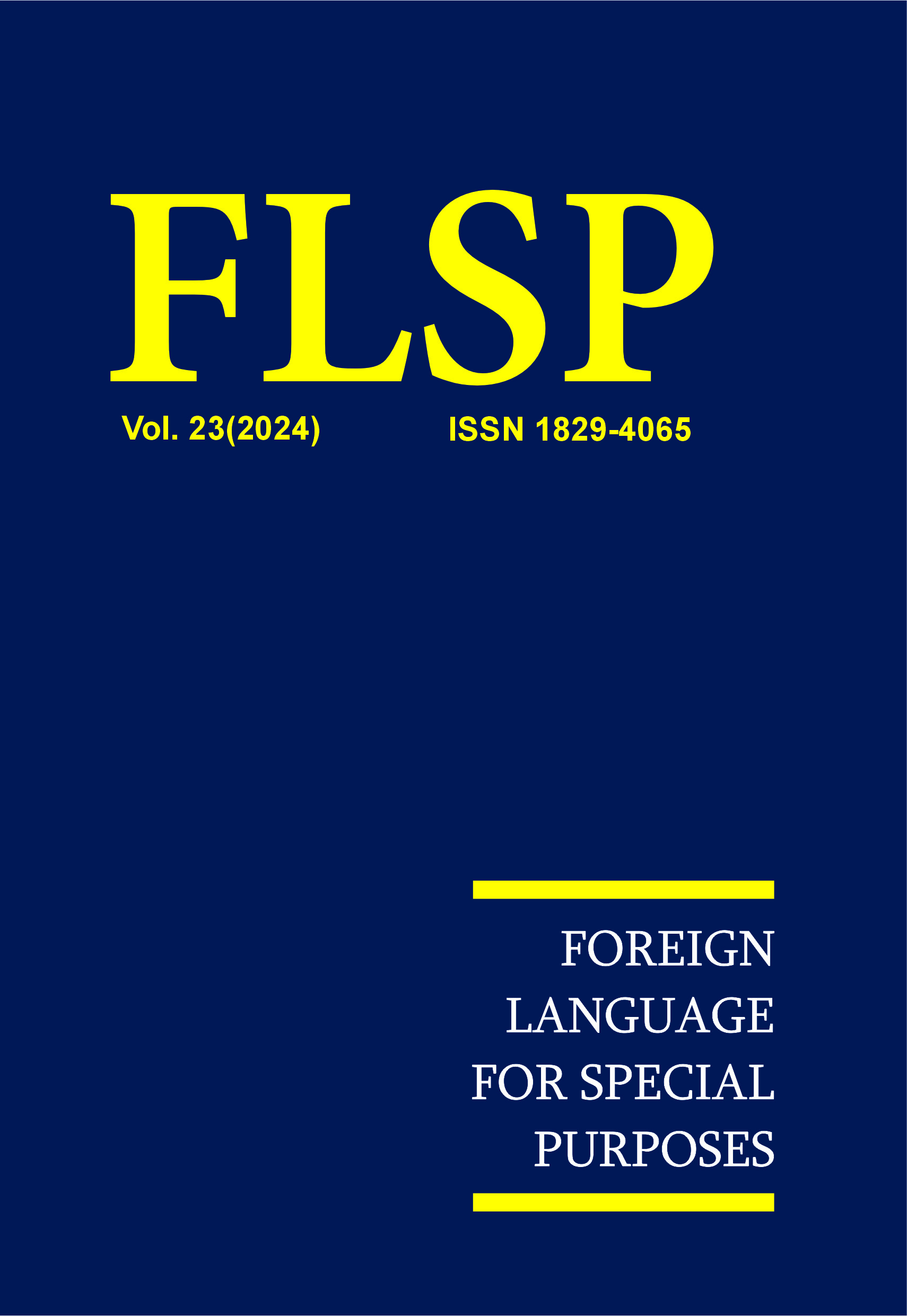TECHNOLOGY OF TEACHING ANALYTICAL READING OF LITERARY TEXT
DOI:
https://doi.org/10.46991/FLSP.2024.23.104Keywords:
rational reading, dynamic reading, critical thinking, reading strategy, synthetic reading, reflective reading, cognitive-discursive technology, literary textAbstract
In a philologically oriented English language course, various technologies for analytical reading of literary text are used. There are various technologies of analytical reading: technologies of fast, rational, dynamic reading, technology of developing critical thinking, technology of using various reading strategies, technology of reflective reading at different levels, technology of speech analysis, etc.. When developing and organizing each course lesson, the problem of concretizing the technology of analytical reading of a literary text arises.
It is important that teachers constantly develop their methodological arsenal and study the technologies of analytical reading. Consistent reading of foreign language fiction is a necessary and important condition for using the technologies mentioned. Besides, both teachers and students should read works of art. It is effective to present a reading list to students at the beginning of the course. Besides, it is effective when the student himself chooses from the mentioned list the minimum that he should read. It is effective when reading each literary work begins with an awareness of a clear purpose and problems of reading.
To use the technology of cognitive-discourse analytical reading demands to carry out serious and consistent preparatory work. It is important in this sense, to study both linguistic and literary works in native and foreign languages.
References
Андреев, О. А. Техника быстрого чтения: Первая ступень: Программа «Доминанта 2000-го года»/ О. А. Андреев., Л. Н. Хромов. - М.: Прометей, 2007. - 160с.
Бородина, В. А. Теория и технологии читательского развитии в отечественном библиотековедении. В 2 ч. Ч.1. : Научные и методологические основы / В. А. Бородина. -М. : Школьная библиотека, 2006. - 336 с.
Ваганова М. Ю.Технологии повышения эффективности чтения: необходимость объединения достижений/Вестник ЧГПУ, №4, 2010. -С․12-24
Голованева М. А. коммуникативно-когнитивное пространство русской драмы конца ХХ века / Дисс. ... докт. филол. наук. – Волгоград, ВГСПУ, 2013. – 450 с.
Даринская Л. А. Возможности технологии аналитического чтения в развитии коммуникативной компетенции студентов// Ученые записки СПбГИПСР. Выпуск 1. Том 23. 2015․ - С.102-108.
Загашев, И. О. Новые педагогические технологии в школьной библиотеке: образовательная технология развития критического мышления средствами чтения и письма / И. О. Загашев [текст] // Библиотека в школе. - 2001. - №17. - С. 56 - 59
Зиганов, М. Как повысить культуру, качество и скорость чтения [текст] / М. Зиганов. - М. : Школа рационального чтения, 2008. - 151с.
Кубрякова Е.С. Что может дать когнитивная лингвистика исследованию сознания и разума человека//Междунар. конгресс по когнитивной лингв-ке. Сб. мат-лов. - Тамбов, 2006. - С. 29-33.
Кубрякова Е.С. В начале 21 века (Размышления о судьбах когнитивной лингвистики)//Когнитивная семантика. Мат-лы второй международной школы-семинара. Часть 1. - Тамбов, 2000. - С. 7-10.
Селевко, Г. К. Современные образовательные технологии : учеб пос. [текст] / Г. К. Селевко. - М. : Народное образование, 1998. - 256 с.
Сметанникова Н.Н. Стратегиальный подход к обучению чтению. – М.: Школьная библиотека, 2005. – 512 с.
Филлипс Л.Дж., Йоргенсен М.В. Дискурс-анализ. Теория и метод: пер. с англ. 2-е изд., испр. Харьков: Гуманитарный центр, 2008. 352 с.
Чернявская В.Е. Дискурс власти и власть дискурса: проблемы речевого воздействия: учебное пособие. 2-е изд., стер. М.: Флинта: Наука, 2012. 128 с.
Anderson, L. W., Krathwohl, D. R., & Bloom, B. S. (2001). A taxonomy for learning,
teaching, and assessing: a revision of Bloom’s taxonomy of educational objectives.
(4), 352//Retrieved from http://books.google.com/books?id=JPkXAQAAMAAJ&pgis=1․
Frank, Stanley D. (1994). Remember Everything You Read: The Evelyn Wood Seven-Day Speed Reading and Learning Program. Cambridge University Press. p. 40.
Golovanova M.A Cognitive-discursive analysis of the art of dramatic method text. -№5(45) 2016. -pp.23-34.
Paul, R., & Elder, L. (2007). Critical Thinking Concepts and Tools.pdf. 27th International
Conference on Critical Thinking, pp. 1–21// Retrieved from
http://web.iitd.ac.in/~nkurur/2015-16/IIsem/cml522/CriticalThinking.pdf
Downloads
Published
Issue
Section
License
Copyright (c) 2024 Igor Karapetyan, Ruzanna Gevorgyan

This work is licensed under a Creative Commons Attribution-NonCommercial 4.0 International License.
Creative Commons Attribution-Non-Commercial (CC BY-NC). CC BY-NC allows users to copy and distribute the article, provided this is not done for commercial purposes. The users may adapt – remix, transform, and build upon the material giving appropriate credit, providing a link to the license. The full details of the license are available at https://creativecommons.org/licenses/by-nc/4.0/

